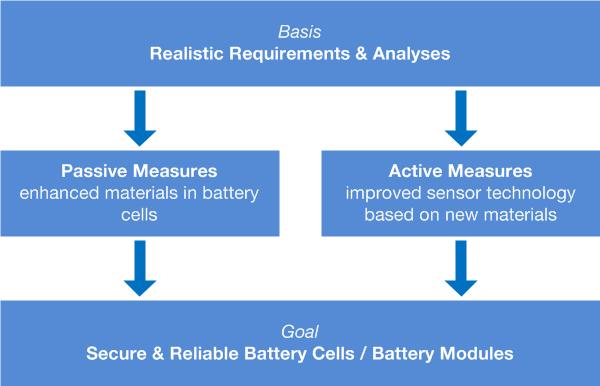Project: SafeBatt: Active and Passive Measures for Intrinsically Safe Lithium-Ion Batteries

Main focus of research activities within the project SafeBatt is on the investigation of active and passive measures at the level of battery components in order to improve the reliability of lithium-ion batteries for electric vehicle applications. Examining security aspects of this novel system for storing energy in vehicles is regarded to be a key factor within the research area of electromobility. Thus, the German Federal Government acknowledged the importance of the project SafeBatt and declared it to be a flagship project within the field of research of energy systems and energy storage. This unique status may be regarded as a hallmark of excellence for upcoming innovations within this research area of electromobility.
Amongst the original equipment manufacturers (OEMs) the most important project partners are BMW AG, Daimler AG and Volkswagen AG. Other than that, several battery manufacturers like Deutsche ACCUmotive GmbH & Co. KG, Evonik Litarion GmbH and Li-Tec Battery GmbH are part of the project. Along with component manufacturers and testing institutions, companies like BASF AG, Wacker Chemie AG, ErlingKlinger AG, SGS Germany GmbH and Infineon Technologies AG play a crucial part in the project. At this stage, it is of paramount importance to state here that Infineon Technologies AG also acts as the overall project coordinator within SafeBatt. Furthermore, research facilities like the Fraunhofer Institute for Chemical Technology, the University of Münster, the University of Braunschweig – Institute of Technology and the Technical University of Munich are part of the project.
Through examining, developing and introducing novel materials, models and sensors, lithium-ion batteries shall be improved in terms of safety and reliability in order to guarantee a successful market penetration of electric vehicles.

The research activities by the department for Electrical Energy Storage Technology are mainly focused on active measures to improve lithium-ion batteries in terms of security with the aid of sensors, the development of a 3D-model for a broader understanding of the processes within lithium-ion cells at certain and relevant testing conditions as well as the generation of various testing processes based on these efforts. Distinct insights gained within this research will be included in setting up a digital pass for batteries.

Acknowledgement
This research project is funded by the Federal Ministry of Education and Research (BMBF) within the framework concept "excellence and technological implementation of battery research - (ExcellentBattery)" (grant number INNP03481611) and cared by Project Management Jülich. The responsibility for the content of this publication lies with the author.